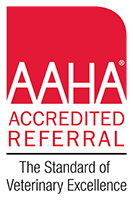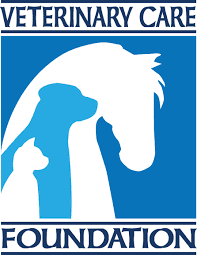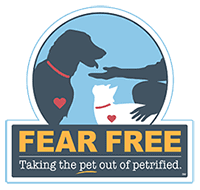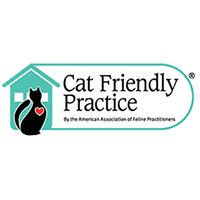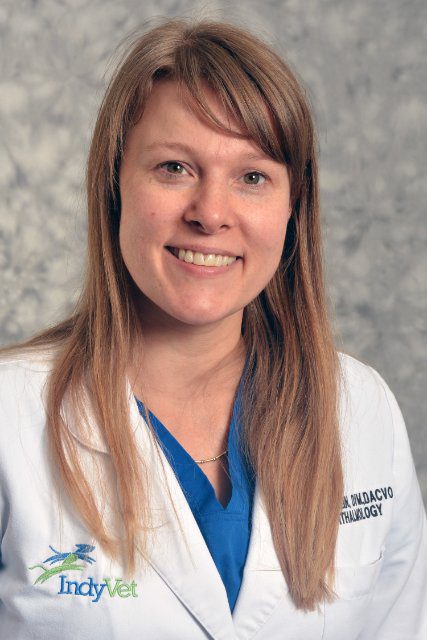
The goal of IndyVet Ophthalmology is to help pets maintain or recover ocular health and vision so they can enjoy an active and healthy lifestyle with their families. A secondary goal is to help identify genetic risk factors of ocular diseases in pets to reduce the perpetuation of these diseases in the breeding population.
All IndyVet specialists have received four or more years of post-doctorate training prior to board certification. This training and experience allows our specialists to manage and treat a wide variety of complex diseases and conditions in collaboration with general practitioner colleagues across the state of Indiana. This collaborative approach to case management allows us to provide the most versatile care for patients.
Veterinary ophthalmologists are veterinarians that specialize in diagnosing and treating eye diseases of animals. Veterinary ophthalmologists perform comprehensive examinations of the eye using good light sources with magnification. The exam evaluates all structures of the eye, including specialized tests of visual function. Ophthalmologists treat some eye diseases with medication while others require surgical intervention.
Similar to a human eye doctor, veterinary ophthalmologists go through years of specialized training. After college, they spend four years in veterinary school, followed by a one-year general internship and a three-year residency program. During the residency program, they see cases and perform surgery under the guidance of board-certified veterinary ophthalmologists, and many publish research papers on eye diseases in veterinary journals. After their residency, veterinary ophthalmologists are required to take a rigorous three-day board examination that evaluates their knowledge and surgical skills through written and practical testing. Once all qualifications are met, the doctor is certified as a veterinary ophthalmologist designated as a Diplomate of the American College of Veterinary Ophthalmologists (DACVO). To learn more about the American College of Veterinary Ophthalmologists, visit www.acvo.org.
Learn More:
The following are signs that your pet is having an eye problem and should be evaluated:
Please call IndyVet at 317-782-4484 and ask for the referral coordinator to make an appointment. Although emergency exams can be accommodated, most examinations are by scheduled appointment. Clients are asked to fill out a questionnaire about the current eye problem and provide a summary of the pet’s previous care prior to the appointment. It is requested that clients bring all medications the patient is currently being treated with to the appointment.
If you want to know more about Cataract Surgery, the following links are helpful:
Want to read about a specific eye problem? Please visit The ACVO Website to read more information about common eye diseases and surgeries.
If you have a blind dog, you may find Blinddogs.net helpful in the care of your pet. Muffins Halohas a bumper harness you can purchase for your blind dog to make getting around a little easier.
If you would like to learn more about how to get a healthy puppy, Companion Animal Eye Registry, or genetic testing, these links are helpful:
The emergency service can initially evaluate an ocular problem that occurs after hours or on weekends. The attending emergency veterinarian can always consult with or call in the ophthalmologist to evaluate, treat, or perform emergency surgery.
Some common eye symptoms that require immediate attention include:
IndyVet provides eye examinations on dogs, cats, and exotic species. The basic examination is comprised of magnified illumination with special ophthalmic instruments to assess all parts of the eye. Additional testing to assess for corneal ulcers, tear flow, eye pressure, and vision may be required. Imaging of the eye with ultrasound or CT is sometimes needed. Usually the entire exam is completed in the exam room with the client present and takes 30 to 90 minutes, depending on the presenting complaint.
IndyVet performs a wide variety of eye surgeries to:
IndyVet performs examinations on breeding dogs or puppies to screen them for heritable eye diseases. OFA registry examinations thoroughly evaluate eyes for genetically acquired diseases. IndyVet will provide clients with a copy of the exam sheet that can be submitted to OFA for certification. For more information, please visit the OFA Website.
The Indiana Veterinary Practice Act prohibits veterinarians from legally refilling medications if a patient has not been examined within the past one year. If your pet has not been examined at IndyVet within the past 12 months, please schedule a recheck exam prior to requesting a refill.
If your pet has been examined at IndyVet Ophthalmology in the past 12 months, please e-mail eyes@indyvet.com or call 317-782-4484 to request a refill of medications. When leaving a message by phone or e-mail, please include your name, your pet’s name, the name of the drug requested, the quantity you are requesting, and the best way to contact you. Refills may be called into a local pharmacy or refilled at IndyVet. Refill requests need to be made Monday through Friday between 8 a.m. and 5 p.m. Please allow 24 hours for prescriptions to be refilled. Refills can be mailed to clients upon request.
